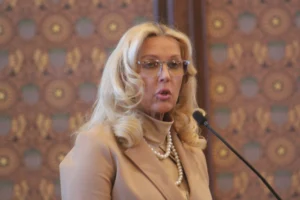Clock ticks on lifting Illinois’ nuclear moratorium as environmental groups want a say
May 13, 2025
Illinois’ energy demand will outmatch its supply by 2030, according to a study from the consulting firm The Power Bureau. That’s why some lawmakers are trying to end a 40-year moratorium on the construction of large-scale nuclear reactors.
The bill to end the moratorium seems to have widespread support, yet it’s stalled as the end of the spring session draws near.
There has been increased demand for artificial intelligence and their data centers, which rely on large amounts of energy to run. There are concerns about Illinois running out of power.
The state has a goal to be to be carbon free by 2050 as part of the Climate and Equitable Jobs Act passed four years ago. Some lawmakers and advocates see nuclear energy as the best option to meet its energy goals, without doing more damage to the environment through greenhouse gas emissions.
Currently, Illinois has the most nuclear energy capacity in the country, with 11 nuclear reactors at six power plants, including the plant in Clinton about a half hour south of Bloomington-Normal. Clinton produces about 1100 megawatts of electricity — enough to power 800,000 homes.
Lawmakers attempted to end the moratorium in 2023, but Gov. JB Pritzker vetoed the bill and then amended the law to only partially end the moratorium, allowing only small reactors to be developed. These are limited to 300 megawatts which can power up around 300,000 homes.
Republican state Sen. Sue Rezin of Morris, who filed the bill, said ending the moratorium is essential to preventing an energy shortage.

“There are reports out there that are stating that the demand is increasing at a rate that our capacity cannot keep up with. So, there’s a need for new power to be built out in the state of Illinois,” Rezin said.
Now Rezin wants a complete lifting of the moratorium on new nuclear projects. Rezin said that needs to be decided soon since it would take 10 to 15 years to build power plants.
Rezin said passing the bill now could entice future nuclear energy companies to come to Illinois.
“It sends a message to potential investors who are looking at building or investing in this industry that, yes, Illinois is open for business,” Rezin said. “But to go through the process is a very long process. At the federal level, it will take six to eight years for the permitting process before you can even start beginning to build.”
Concerns and opposition
Not everybody supports putting more of the state’s focus on nuclear energy.
The bill is currently stuck in the Illinois Senate as environmental groups work with lawmakers to come up with a nuclear plan that they can live with. One of the opponents is the Illinois Environmental Council.
Executive Director Jen Walling said the organization has concerns about the cost of new power plants, noting projects in other states like Georgia which took longer to build and cost more than anticipated.
“If we build a large nuclear facility, or if there’s an expansion of current nuclear facilities, how long will it take to help meet our capacity needs, and how much is it going to cost?” Walling said.
Walling also said she also has concerns about waste produced by nuclear plants. The responsibility of securing waste is up to the federal government. But Walling said she doesn’t trust the Trump administration to regulate this procedure. The administration fired more than 300 nuclear staff in February but then moved to rehire them after realizing some were responsible for overseeing the U.S. stockpile of nuclear weapons.
“I would want to see fully staffed government agencies to ensure that everything is done correctly,” Walling said. “And that we’re not going to see any accidents or disasters or any type of pollution from building it or some radiation leak that that our communities don’t deserve. I’m definitely very concerned about the expansion of large facilities when the Trump administration isn’t guaranteeing anyone’s safety. “

Walling said there needs to be more state regulatory workers to ensure any nuclear development is safe.
Walling also said Illinois should focus on renewable energy, which she said is cheaper and quicker to build.
“I would like to see an energy policy in Illinois that prioritizes renewable energy, so wind and solar first and storage,” Walling said. “And then with nuclear facilities, if it’s a new one, or if it’s an expansion, just us doing a deep dive to ensure critical oversight of those facilities.”
But Walling understands there are likely votes in both chambers to expand nuclear in Illinois.
Pritzker has said he wants to see an expansion of nuclear energy, but has not committed to signing the bill.
“We’re looking forward to having a bill that comes to my desk that will allow us to expand the options for nuclear in the state of Illinois,” Pritzker said last week. “But it has to be done in the right way, and I think the legislature and my team are working together to make sure that that happens.”

The bill seems to have broad bipartisan support in the state legislature, but yet it missed a key deadline as lawmakers are still working out a compromise with environmental groups that are opposed to any expansion of nuclear energy. Since lawmakers did not vote on the bill by the end of last week, lawmakers now need to lump it into a broader energy package to get the measure to the governor.
Democratic state Sen. William Cunningham of Chicago co-filed the bill and said he’s not deterred by the delay; he said many nuclear advocates and environmental activists are on the same side when it comes to preventing future use of fossil fuels.
“In recent times, the biggest environmental hazard we’re facing is carbon,” Cunningham said. “And I think a lot of people in the environmental community have come around (and) have seen that, while they might not necessarily be pro-nuclear, they see it as a very important bridge to getting to a carbon-free generation.”
Opponents are still concerned about hazardous waste and the cost of future projects. Cunningham said they are negotiating with them to pass a version that works for everyone.
A Bloomington lawmaker who voted for ending the nuclear moratorium in 2023 said she wants to see a full expansion of the state’s nuclear capability, something Illinois hasn’t seen since 1987.

Democratic State Rep. Sharon Chung said nuclear energy should be a key part of Illinois’ renewable energy strategy.
“We’ve done a lot with wind and solar in a lot of different counties, especially in McLean County,” Chung said. “But if we want to try and hit those goals and to focus on renewable energy, clean energy, we’ll be able to get there easier if we had nuclear power in the mix.”
While the bill is currently stuck in committee, Rezin said she’s cautiously optimistic the nuclear expansion will pass this spring, and it will end what she calls Illinois’ “outdated moratorium.”
Search
RECENT PRESS RELEASES
Related Post


